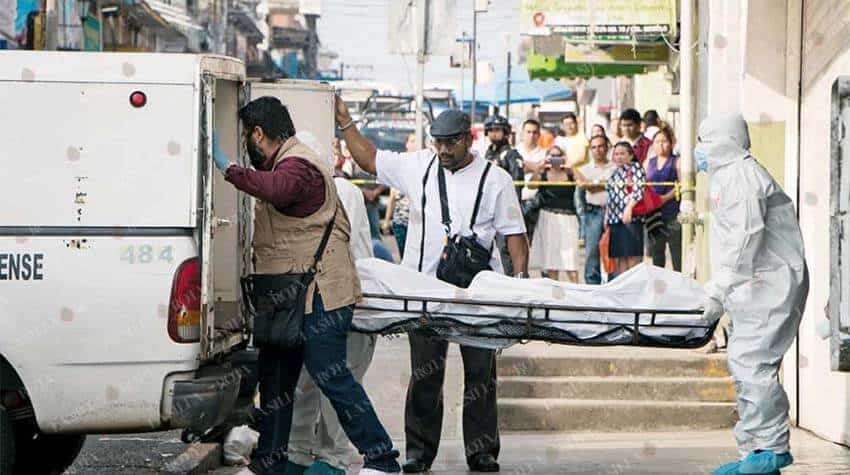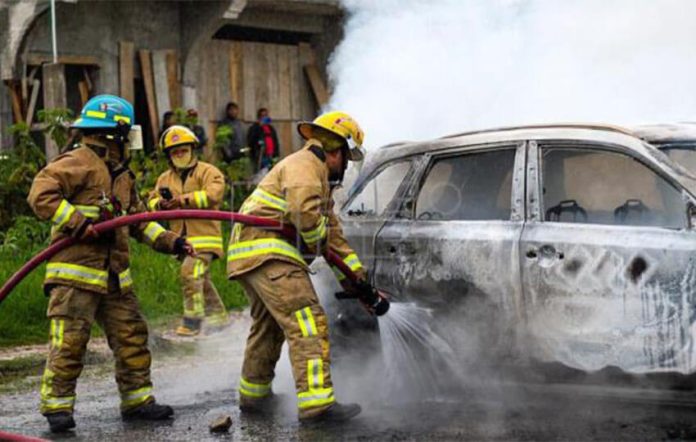Crime groups control or are seeking to control public markets, commercial districts and the distribution of basic foodstuffs across much of Mexico — and in many cases, they’re willing to use violence to achieve their goals.
The tactics used by organized crime have come into sharp focus this week due to events in Guerrero and Chiapas, but the happenings there are preceded by similarly distressing occurrences in other states.
In Chilpancingo, a string of murders of people who worked in the poultry industry – including distributors of fresh chicken to markets – shut down most chicken stalls at the city’s markets this week. Meanwhile, a dispute over control of the largest market in San Cristóbal de las Casas triggered a frightening show of force from one crime group on Tuesday.
Organized crime’s desire to make money via extortion and broader criminal control of markets, commercial districts and food supply chains is far from unique to those cities. Extortion is a problem in most states, and business owners who don’t comply with criminals’ demands run the risk of paying for their decisions with their lives.

Cuauhtémoc Rivera, president of the national small business association ANPEC, told the newspaper Milenio that the only states where crime is not a significant problem in markets and other shopping areas are Yucatán, Aguascalientes and Querétaro. In much of the country, an increase in extortion demands and general insecurity has put businesses “against the wall,” he said.
Official data shows that México state has the worst extortion problem in the country, with almost 1,400 reported cases in the first four months of the year. The other states in the top five for extortion between January and April were Nuevo León, Guanajuato, Jalisco and Zacatecas. However, many such cases – if not the majority – go unreported.
In Guanajuato, 32 people have been killed in the businesses where they worked so far this year, according to Milenio. All but three of the attacks occurred in Celaya, a city where extortion has long been a problem. Among the businesses where the murders have occurred are auto repair shops, butchers, florists and market stalls. Most recently, the organizer of a tianguis, or outdoor market, was shot dead. Milenio also reported that decapitated human heads have been left outside public markets in Celaya on at least two occasions this year.
In Veracruz, four vendors of food products have been murdered this year. Two of the victims were butchers in Coatzacoalcos who were apparently killed for refusing to make extortion payments. Two female fruit and vegetable vendors were murdered in Cosoleacaque for the same reason last November. Milenio reported that the failure to make extortion payments has also led to businesses being set on fire and homes being shot at in the Gulf coast state. Violence related to the refusal to pay extortion has been a problem in Veracruz for years.
In southern México state, criminal groups have controlled the distribution and sale of products such as chicken, eggs, tortillas, cigarettes and construction materials for years, according to residents who spoke with Milenio. Residents of Sultepec, a municipality on the border with Guerrero, say that the prices for many products are high because criminals monopolize the market.
Extortion is also a major problem in the metropolitan area of Toluca, the México state capital, where fresh chicken shops have been one of the main targets. Four chicken and egg vendors at the city’s main wholesale market were murdered in 2020 for failing to make extortion payments.
In neighboring Guerrero, former bishop Salvador Rangel Mendoza said late last year that the distribution of beer and soft drinks was among the activities of crime groups. Earlier this month, violence and threats from organized crime forced tortilla shops, schools and public transport to shut down in Zihuatanejo, a Guerrero resort town.
Rivera said that crime groups control markets for certain products in the cities of Acapulco, Chilpancingo and Taxco – all located in Guerrero – as well as in Ixtapan de la Sal, a México state municipality close to the border with Guerrero. In some cases, they steal goods from distributors and sell them themselves, but crime groups’ main way of controlling a market is by collecting extortion payments from business owners and/or forcing them to buy products at inflated prices from certain suppliers under their influence.

“They fix the final prices,” Rivera said, referring to crime group’s influence over retailers. The ANPEC chief also said that the size of typical extortion payments – usually paid monthly or weekly – has increased from 200 pesos to 500 pesos (about US $25) in some places.
“The geography of crime in the country is marking life in at least two-thirds of the national territory. The symptoms are noted in the southeast, in places like Oaxaca, Michoacán, Guerrero, … in Mexico City in boroughs like Cuauhtémoc and Miguel Hidalgo [and] in Coahuila, Nuevo León, Zacatecas,” Rivera said.
“… These groups focus on stable businesses like taco restaurants, [small inexpensive eateries called] fondas [and] shops. That’s where they start, and people don’t report them because in a lot of areas, the line between police and criminals isn’t clear. The crime economy is very active,” he said.
“There is evidence that these gangs are, little by little, taking control of … the distribution and commercialization of products. This is [a] very delicate [situation],” Rivera said before adding that decisive action could stop the problem from getting worse.
Another place where criminal activity has affected the availability of chicken is Ciudad Hidalgo, Michoacán, located about 100 kilometers east of the state capital of Morelia. Residents were left without chicken and red meat earlier this year due to a dispute between the Los Correa Cartel and a cell of the Jalisco New Generation Cartel called Grupo X, Milenio reported.
“We closed due to insecurity,” said Óscar Mañón, a chicken vendor in the Emiliano Zapata market. “… They’re letting us work now, but I don’t know whether [the same thing] could happen again.”
According to Ciudad Hidalgo Mayor José Luis Téllez, butcher shops and chicken shops closed after receiving threats from both crime groups involved in the dispute. Prior to the monthlong meat dearth, which began in late January, a group of armed men attacked the municipal slaughterhouse and killed five workers.
In Oaxaca, extortion complaints have increased in the coastal municipalities of Santiago Pinotepa Nacional and Santiago Jamiltepec over the past three months, according to local authorities. Business owners say they have received phone calls and messages from criminals demanding payments and threatening consequences if they don’t comply. The extortionists have acted on those threats in Pinotepa Nacional, where a butcher and two other people were recently killed.

Extortion is also a problem thousands of kilometers to the north in Tijuana, Baja California, especially in Sánchez Taboada, which has been described as the most dangerous neighborhood in the country’s most dangerous city. According to Baja California Attorney General Ricardo Iván Carpio, criminals collect extortion payments from a range of businesses in the area, including auto repair shops and butchers.
However, authorities are making progress in their fight against the crime, Carpio said, noting that 50 priority targets, including extortionists, have been arrested in the past 13 days.
With reports from Milenio
